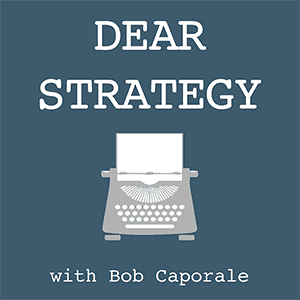Dear Strategy:
“What are the most important points to stress when presenting new ideas to senior management (i.e. financials, feasibility, product differentiation, etc.)?”
Anyone who follows this show and this blog probably knows my process for strategic storytelling by now. That is, following what I like to call “The Strategic Arc.” This simple tool gives us five different parts of every good strategic story – situation, problem, solution, execution, results. So, the question then becomes, which of these parts is the most important one to focus on during your strategic presentation? And my answer is…
None of them.
Of course, I can give the academic response that (cue professorial voice) “every strategy is going to be different and, depending on your current situation and what it is that you are trying to achieve, every presentation will have its own unique set of priorities to stress.” Of course, that’s all true. But, in my experience, none of this will make any difference from the standpoint of an executive who has to listen to you blabber on for 30 minutes after 12 other product or business managers have already done the same.
The truth is – and I know nobody wants to hear this (and probably no executive wants to admit it) – sitting through a day’s worth of strategy presentations is exhausting. And no C-level person that I’ve ever met truly has the time or energy to get into every detail of every plan. Assuming you’re a product or portfolio manager, that’s why your job exists – so that your company executives can focus on the bigger picture of how everything comes together. With that setup, it follows that executives on the receiving end of most strategy presentations will only tune in to a relatively small percentage of each one. And, although you might be tempted to try and control what parts of your presentation your audience actually focuses on, there’s a bit of human psychology at play here that is not totally within your conscious realm of control. That is, your audience will tend to tune in to those parts of your presentation that are most important to you. Or, said differently, they will focus in on whatever part of your plan you are most passionate about.
When you are truly passionate about your plan, you will automatically engage your audience. Think of a TV evangelist, or a pitch person, or even the best sales person you’ve ever met. Whether you ultimately believe what they say or not, you tune in because of their conviction. They believe so strongly in what they are saying that it causes you to want to listen just to see what is making them feel so impassioned. And that causes you to focus in on what they have to say.
Turning all of this back to the question at hand, the most important points to stress in your presentation are whatever points are most important to you. If you tell people what you think they want to hear, they most likely won’t believe you anyway because we humans are capable of picking up on feelings that are far deeper than the words we speak. As a person who has been on both sides of strategic presentations, I can tell you that the plans that I tended to support the most had little to do with the numbers or actions that were being presented to me. It had to do with how confident I was that the presenters had actually done their homework and believed in what they were saying. In fact, some of the most successful plans that I’ve ever supported were also the ones that, on paper, probably had the least chance of succeeding. But I didn’t react to the paper, I reacted to the person behind the paper. And rarely did that approach fail to pay off.
So, far more important than trying to anticipate what should be the most important points to stress in your presentation, is to make sure that you have a plan you believe in with points that are truly important to you. Then you won’t have to think about it. The stress will just come naturally.
And, yes, when it comes to some strategic presentations, you can interpret that last sentence any way you like.
Listen to the podcast episode
Dear Strategy: Episode 046

###
Bob Caporale is the author of Creative Strategy Generation and the host of the Dear Strategy podcast. You can learn more about his work by visiting bobcaporale.com.





